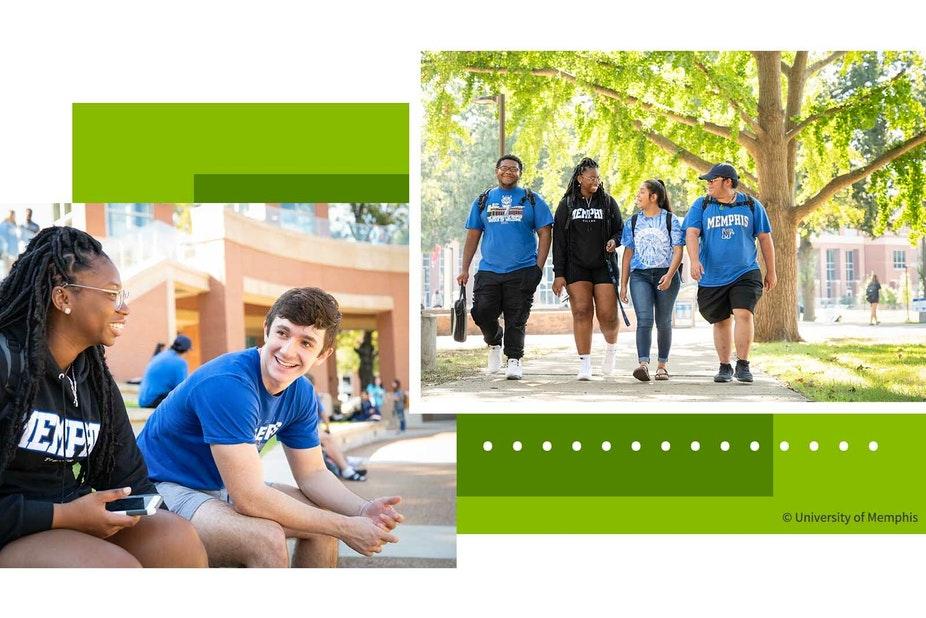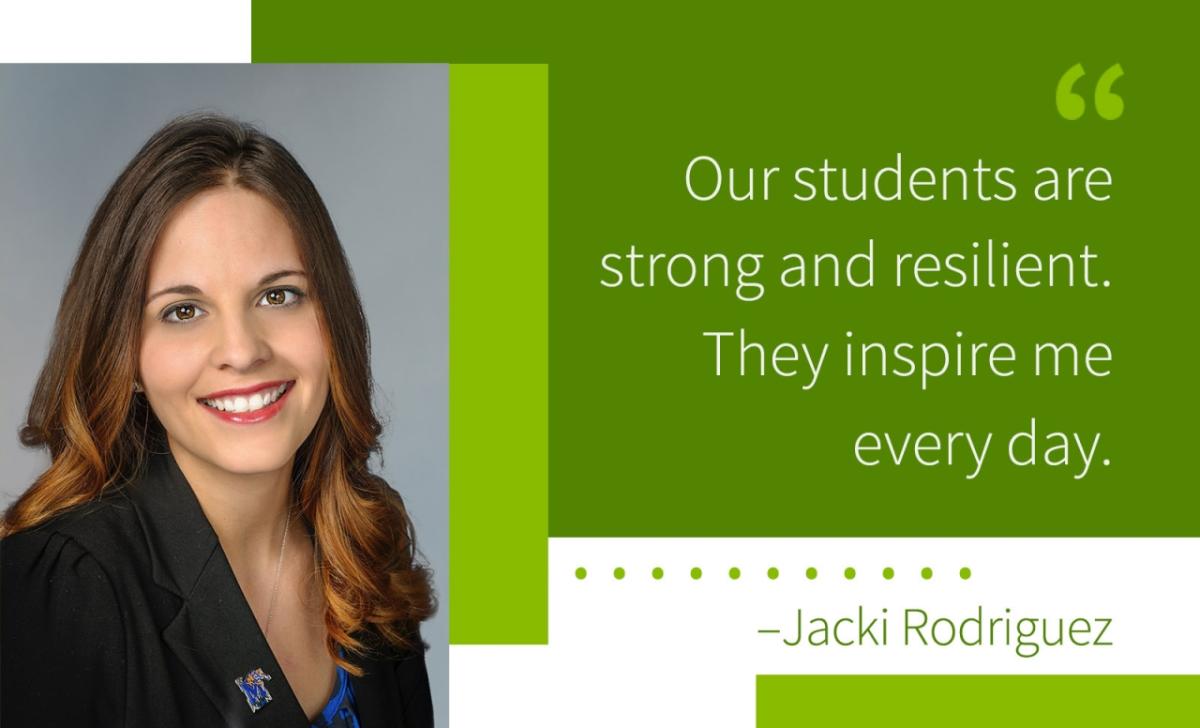How This Sense of Belonging Helps Students Thrive
Supporting education is crucial for Regions Bank. The work of Jacki Rodriguez is just one reason why.
By Kim Borges
“Don’t do what I did.”
It’s not advice University of Memphis freshmen might expect to hear during their first week of college. That’s precisely why Jacki Rodriguez shares it.
“I didn’t go to class for the first few days,” recalled Rodriguez of her own campus arrival back in 1999 as part of the University’s First Scholars® Program serving first-generation college students. “I was the valedictorian at a very small high school, and I was too embarrassed to walk in the door.”
A few weeks into the semester, Rodriguez began to overcome self-doubt and hit her stride. Following graduation, she joined the university’s Alumni Association staff.
And today, Rodriguez serves as director of the same program propelling students to academic and career success that drew her to campus more than 20 years ago.
“I never really left,” she said. “I love this work.”
Regions Bank in Memphis supports that work by funding scholarships for four First Scholars each year.
According to the University of Memphis’ Office of Institutional Research, first-generation students make up 38% of its student population.
“Access to a college education is transformational for first-generation students,” said David May, commercial banking regional executive and market executive for Regions Bank in Memphis. “Awarding scholarships benefitting low- and moderate-income students aligns with Regions’ strategic community priority to support education. Investing in the First Scholars Program demonstrates our commitment to changing the lives of students and families right here in our Memphis community.”
From the moment Rodriguez delivers her unexpected advice, she ensures First Scholars receive the support they need to get off on the right foot. That begins with an introductory Skills to Success class.
“We start with the basics,” Rodriguez explained. “That includes defining what a syllabus is, determining your major, discussing the importance of communication and creating a sense of connection.”
The program also broadens students’ horizons by requiring them to participate in two campus activity groups and in networking activities.
Like Rodriguez, Randy Truong understands just how important that sense of connection on campus is. Truong, a sophomore, is currently a program peer mentor.
“As a first-generation student myself, I know exactly what it feels like to walk into a situation where you have no idea what you’re doing,” said Truong. “Programs like First Scholars give students like me a sense of belonging that helps you thrive as a student. As a peer mentor, I offer fellow students a space to comfortably ask questions and address any concerns they might have about campus by locating and sharing resources that will contribute to their success on their collegiate journey.”
Those resources extend beyond the classroom’s walls, with monthly one-on-one meetings between Rodriguez and the 80 First Scholars covering a wide range of topics.
“Beyond what’s going on in class, we look at what’s going on at home,” she said. “Many of our students are working 30 hours a week to help support their families. Many also take on a parental role with younger siblings by providing childcare and helping them with schoolwork because their parents are working. Our students face a lot of financial pressures.”
To help reduce that pressure, Regions associates teach financial education classes like Banking Basics for Students and Reality Check, two free modules from the bank’s Next Step curriculum. Willie Petty taught both sessions.
“The First Scholars were very engaged in our sessions,” said Petty, manager of Regions’ White Station branch in Memphis. “We had especially rigorous financial conversations during the Reality Check session with the students asking questions about challenges they’re facing in their current environment. I absolutely loved seeing that ‘light bulb’ turn on for the students.”
The financial advice and guidance Petty and his teammates provided about stretching a dollar has been especially valuable during the pandemic.
“Over half of our students caught COVID because they’re frontline workers in restaurants and grocery stores,” said Rodriguez. “They’ve also had family members affected by the pandemic. We had to go virtual, which wasn’t as comfortable and exposed digital divide issues as well. It’s been one of the most difficult obstacles I’ve ever faced in this role.”
It would be understandable for Rodriguez and the First Scholars to be discouraged by facing so many challenges. Understandable, but not likely.
“There is no ‘failing’ at the University of Memphis,” she said. “We call it a First Attempt In Learning. You don’t have to be perfect, you just have to keep going. Our students are strong and resilient. They inspire me every day.”
Rodriguez’s tenacity also inspires her students, and her care in looking out for them has earned her a nickname among the First Scholars.
“They call me Mama Jacki,” she said.
And the greatest gift Rodriguez gives them as that maternal role model? A priceless one that will last a lifetime: self-confidence.
“Some of our students have what’s called ‘Imposter Syndrome’ of feeling they may not be deserving of being in the program,” she said. “We help them work through those doubts by convincing them that, yes, you do belong here, you can do this.”
Just like she did.
Want to learn about more the impact the University of Memphis First Scholars Program is creating for participants?
Check out these stories on The University of Memphis website.



